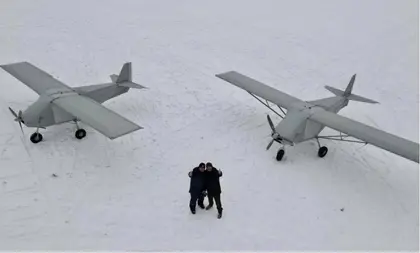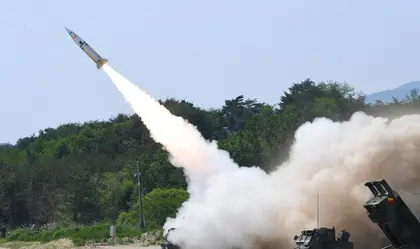A source “familiar with the situation” told Bild that the recent drone strikes by Ukraine’s Armed Forces (AFU) on Tatarstan, was just the beginning.
Ukraine's Military Intelligence Directorate (HUR) confirmed on Tuesday, April 2 that Ukraine had targeted a drone assembly facility in Yelabuga and an oil refinery in Nizhnekamsk, both in Tatarstan, more than 1,200 kilometers (745 miles) from Ukraine. The weapons used are said to have been a modified UJ-22 drone fitted with additional fuel tanks to extend its normal 800-kilometer range and a Ukrainian ultra-light aircraft Aeroprakt A-22 “Flying Fox,” filled with explosives and adapted to act as a drone.
JOIN US ON TELEGRAM
Follow our coverage of the war on the @Kyivpost_official.
According to Bild’s source the AFU will take delivery of drones from 10 separate manufacturers with ranges of 2,000 km and more. It is hoped that these unmanned aerial vehicles (UAV) will make up for the limited numbers of long-range missiles in Kyiv’s armory.
“Rockets are a thing of the past. Drones are the future,” the source said. He said that the Luch design bureau has developed the Sokol-3000 UAV, which can fly over 3,000 kilometers. Such a weapon would allow Ukraine to hit targets in the Murmansk region where there are more than 80 military bases, one of which the Olenya airfield is home to the strategic bombers that have launched hundreds of missiles against Ukraine.
These capabilities will be good news for Ukraine’s ability to defend itself and take the fight ever deeper into the Russian mainland while presenting Russia with a whole new range of military, political and social problems to deal with. According to Tatar political commentators Tuesday’s strike the population “is scared and shocked by the fact that… the war came to them, [so far] from the front line.” One can only imagine it would be an even greater trauma in Murmansk.

Deadly Shooting After an Argument Between Ukrainian Troopers in Kharkiv Region
It will not only be the Kremlin that will find this a test. NATO’s allies are already split on Ukraine’s current limited ability to hit targets in Russia. Partners such as those in the Baltic nations, the UK, Finland, and France believe that strikes on oil refineries and military targets inside Russia are legally justifiable and that Ukraine should be able to defend itself in any way it chooses.
Finland’s Foreign Minister Elina Valtonen is quoted by the Moscow Times as saying, in answer to a question about the Tatarstan attacks, at the NATO foreign ministers meeting on Thursday: “The UN Charter allows a country, while defending its independence, to attack military targets. So, I would just leave it like that.”
Other nations are concerned that attacks on Russia risk further escalation of the war and that attacks against the oil industry could destabilize the global energy market. This fear is one of the main drivers for the reluctance of Germany to provide Taurus cruise missiles and the US (up until now) to provide ATACMS missiles, both of which only have a 300-kilometer range.
At a recent press conference in Paris, France US Secretary of State Antony Blinken, said that Washington “has neither supported nor enabled” strikes by Ukraine outside its internationally recognized borders.
Alongside him French Foreign Minister Stephane Sejournet said that as far as France was concerned Kyiv was acting “within the framework of legitimate defense.”
You can also highlight the text and press Ctrl + Enter






